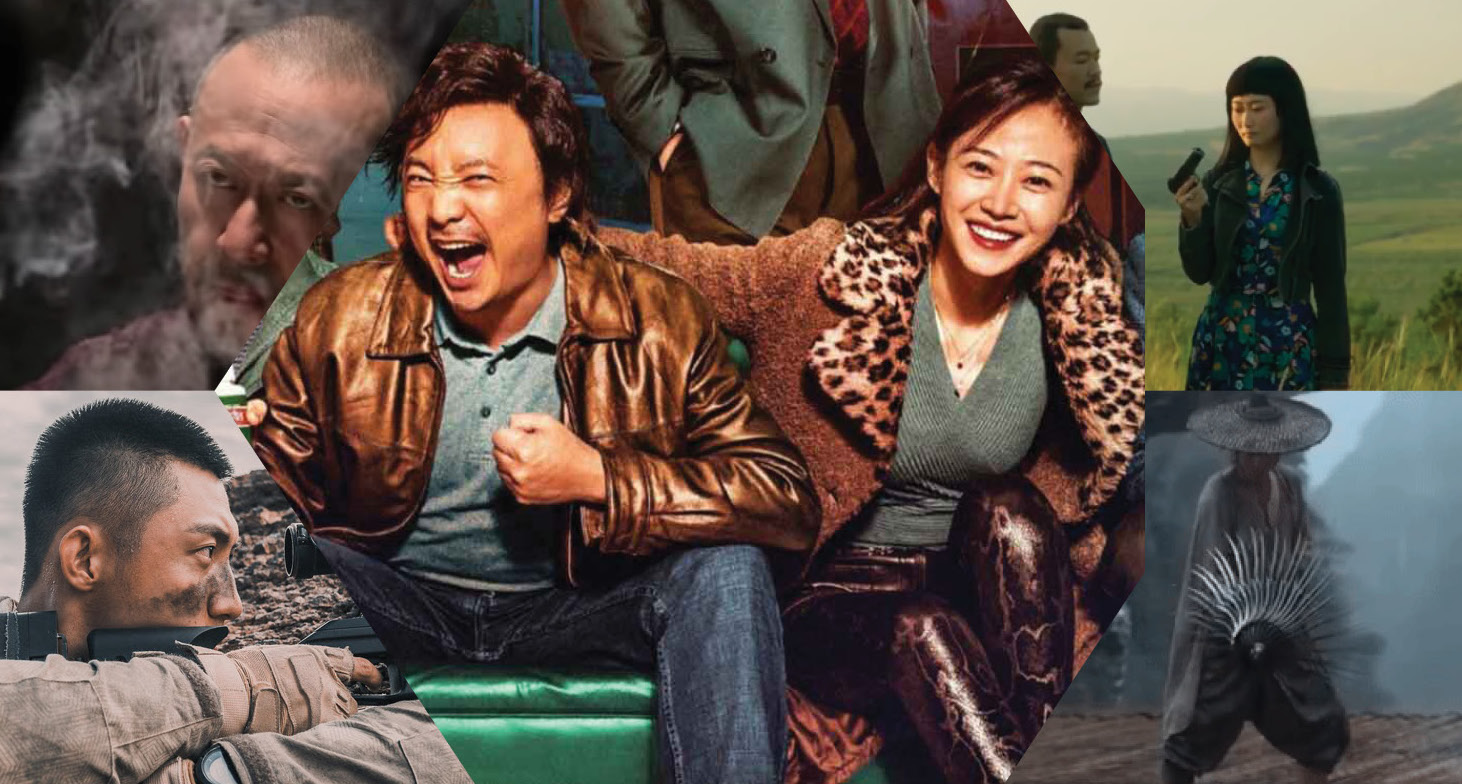5 must-see Chinese movies of 2018

Five noteworthy Chinese movies from 2018, including from big-name directors Zhang Yimou, Jia Zhangke, and Jiang Wen.
As 2018 comes to a close, I’d say it was a good year for Chinese movies. Granted, there were plenty of dumb comedies and sappy romances, and also a few terrible sequels to extremely profitable movies that weren’t particularly good to begin with (I’m looking at you, Detective Chinatown 唐人街探案 and Monster Hunt 捉妖记). On the other hand, there were great movies from established directors like Zhang Yimou 张艺谋, and impressive debuts from newer directors like Wen Muye 文牧野 and Rene Liu 刘若英. Mulling over all the Chinese movies I’ve seen this year, I’d like to recommend five that particularly stood out to me. There are still some buzz-worthy releases I haven’t seen yet, such as the critically-lavished An Elephant Sitting Still 大象席地而坐 , and Chow Yun-fat’s 周润发 Project Gutenberg 无双, so feel free to add anything I’ve missed in the comments section below.
Shadow 影
Dir. Zhang Yimou 张艺谋
The director of such classics as Raise the Red Lantern 大红灯笼高高挂 and Hero 英雄, Zhang Yimou is one of the best-known filmmakers working in China today. He’s made a lot of acclaimed and popular movies over his 30-year career, but Zhang’s efforts the past decade or so have been a mixed bag. In 2016, his English-language monster movie The Great Wall 长城 was largely panned, disappointing at the box office in both China and the United States. Reviewers faulted the movie for its focus on action instead of plot, and there was also criticism for featuring two white male leads in a story set in Song-era China.
Fortunately, Zhang’s latest movie is a far cry from that mess. Like so much of Zhang’s work, Shadow takes place in China’s rich past, this time revisiting the country’s Three Kingdoms period. The action takes place in Pei, a kingdom that has recently lost an important city called Jing to an enemy kingdom. The kingdom’s cowardly king is all too eager to give the city and his sister up in marriage to the enemy, but his commander Yu has other ideas. Yu secretly has a “shadow” also named Jing, and he creates a plan to use his doppelganger to retake the lost city.
The action scenes here are top-notch, and actor Deng Chao 邓超 gives a wonderful performance, playing both Yu and Jing. Zhang Yimou is notable for generally using bold colors in his work, but Shadow is shot in a style inspired by Chinese ink wash painting, with a stunning monochrome scheme that makes it look like a black-and-white movie.
https://www.youtube.com/watch?v=OAVqidfnSMw
Dying to Survive 我不是药神
Dir. Wen Muye 文牧野
Inspired by the true story of Lu Yong 陆勇, a Chinese man with leukemia who smuggled leukemia-treating drugs from India into China, Dying to Survive was a huge summer hit at the box office. In her review of the movie earlier this July, The China Project columnist Pang-Chieh Ho said it “might be China’s best movie of the year.” Chinese moviegoers have also rated this comedy-drama pretty highly, with a 9.0 average rating on Douban from over 800,000 users.
Produced by comedy directors Ning Hao 宁浩 and Xu Zheng 徐峥, the latter plays Cheng Yong, a peddler who specializes in aphrodisiac drugs. Cheng’s store has fallen on hard times, but when a man suffering from leukemia comes to the store, he tells Cheng about a generic leukemia-treating drug from India that’s a lot cheaper than the expensive Swiss brand available in China. Seeing a way to make a ton of money, Cheng travels to India so he can smuggle and sell the drugs in China.
Cheng’s smuggling proves to be a profitable, albeit risky, enterprise. At one point, Cheng stops his scheme, but picks it back up again after realizing the good he’s doing for leukemia patients. In a country where socially conscious dramas aren’t really encouraged, a movie as heartwarming and well-made as Dying to Survive deserves kudos for tackling an issue as sensitive as the cost of medical care.
https://www.youtube.com/watch?v=50tHqmi_Kz0
Ash is Purest White 江湖儿女
Dir. Jia Zhangke 贾樟柯
Director Jia Zhangke originally made a name for himself in China’s indie scene with The Pickpocket 小武, an underground drama shot on a budget of less than 400,000 RMB (about $50,000). Jia’s work has become increasingly more ambitious over the years, and Ash is Purest White is his most expensive and commercial movie to date.
Spanning over three different time periods, Ash is Purest White opens in 2001 in a declining coal-mining town in Jia’s native Shanxi province. Among the town’s inhabitants are a tough dancer named Qiao, whose gangster boyfriend Bin owns a nightclub. After Bin’s boss is murdered, he finds himself the target of some street thugs, and he’s nearly killed before Qiao scares his attackers off by shooting a gun. Both Bin and Qiao end up arrested, and even though the illegal gun belonged to Bin, Qiao takes the blame and earns a longer prison sentence than her boyfriend.
During Qiao’s five-year sentence, Bin doesn’t bother to see his girlfriend even once. When Qiao is finally released in 2006, Bin is nowhere to be found. Stuck in a China she no longer recognizes, Qiao sets out to find the boyfriend who also left her behind. It’s an epic and enthralling story, with an offbeat sense of humor and a welcome dance scene featuring the Village People’s “Y.M.C.A.”
https://www.youtube.com/watch?v=6ZxEWvXzdJ0
Operation Red Sea 红海行动
Dir. Dante Lam 林超贤
According to Box Office Mojo, Operation Red Sea is the highest-grossing Chinese movie of the year, at more than $575 million. Made in collaboration with the People’s Liberation Army Navy, this war story of a fictional Navy rescue mission features actual military equipment, including six Chinese warships in one scene. Some critics have labeled the movie propaganda, and while I debated including it on my list, its popularity and craftsmanship would make it a mistake to ignore.
Although loosely based on an incident from the 2015 Yemeni Civil War, Operation Red Sea changes the location to a fictional country in the Middle East called Yewaire. Yewaire has fallen into a violent civil war, leading the Chinese navy to dispatch the elite Jiaolong Assault Team to evacuate Chinese civilians from the country. The rescue operation proves to be a success, but Jiaolong’s mission is complicated when they discover that local terrorists are plotting to create dirty bombs.
The members of the Jiaolong team aren’t particularly interesting or memorable, but the movie really shines in its pulsating set pieces, ranging from a fight against Somalian pirates to urban skirmishes with the Yewaire terrorists. Director Dante Lam packs the action with blood, dismemberment, and explosions, and unlike other classic Chinese war movies, Operation Red Sea’s raw violence suggests there’s nothing glorious about the warfare it depicts.
https://www.youtube.com/watch?v=imrCWOOPiOs
Hidden Man 邪不压正
Dir. Jiang Wen 姜文
Following Let the Bullets Fly 让子弹飞 and Gone with the Bullets 一步之遥, director Jiang Wen’s Hidden Man is the third and final piece of an action trilogy set in pre-Communist China. Its hero, Li Tianran, is an American-trained doctor with a dark past. As a boy, Li’s kung-fu master and his family were brutally murdered by a pair of men named Zhu Qianlong and Nemoto Ichiro. The murderers set Li on fire and left for him dead, but he miraculously survived the attack and later moved to San Francisco to study medicine.
Now a young man going by the first name of “Bruce,” Li also acts as a spy, and he’s sent to China to spy on the Japanese. Arriving in Peiping (now known as Beijing) in 1937, Li learns that the Japanese are on the verge of invading the city. Still, while focusing on his mission, Li can’t forget about the men who killed his master. He discovers that one’s become a police chief, and the other is now a Confucian teacher. Adding to the intrigue, Li becomes involved with a seamstress looking for her own revenge, and another woman who turns out to be Zhu’s mistress.
Hidden Man has a lot of twists and turns, and while some of them are neat, they can also make the movie feel pointless or distracted at times. Regardless, while it might run on a bit too long, it generally has a charming kind of energy to it, and a delightful, absurd sense of humor. In other words for Jiang Wen fans: It’s not quite as good as Let the Bullets Fly, but it’s a definite improvement over the disappointing Gone with the Bullets.
https://www.youtube.com/watch?v=b8ylaLeCMoo











